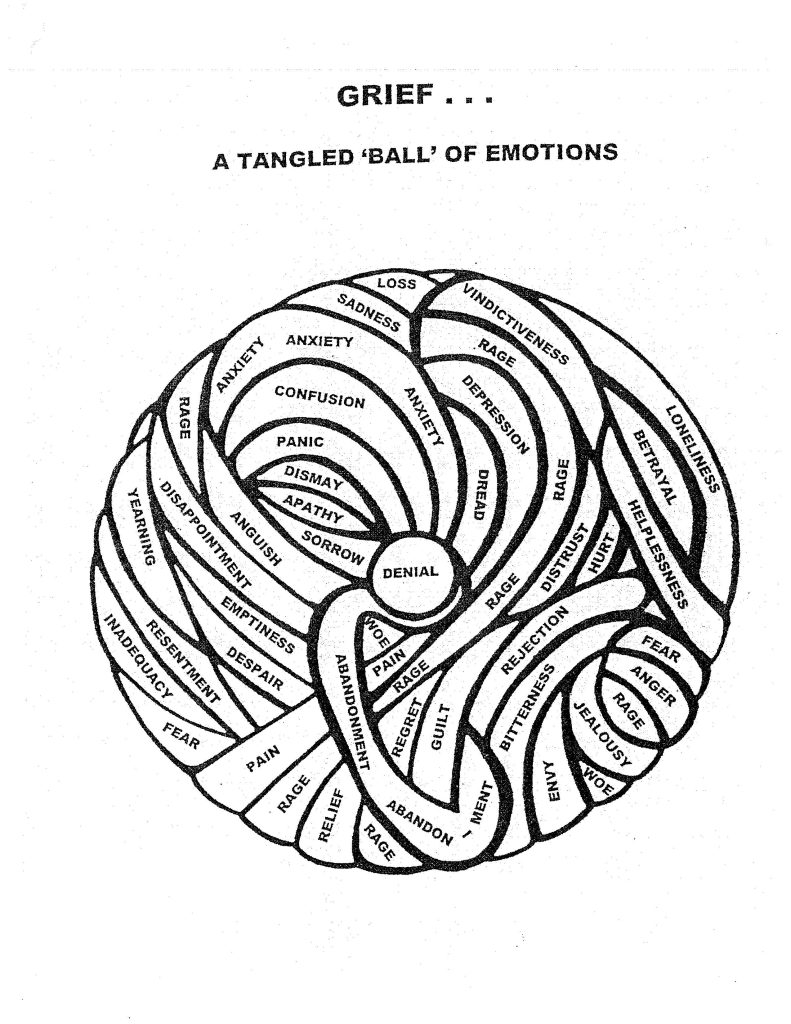Processing Parental Grief: When the Concept of a ‘Normal’ Family is Shattered
As parents, you may have held a standard of what you want or hoped for your family. You had a pretty clear idea of how you’d like your family to grow together. Having a child or children with mental health challenges can turn your expectations on its head.
There is nothing shameful about the grief and loss you may feel because of the changes when your son or daughter needs professional therapy. Especially when this therapy is in the form of residential care that can require your child to live separately from you for a while.
However, this isn’t the only reason parents grieve during these times. This blog will discuss the multifaceted parental grieving process in light of their child’s mental illness. We will also share some suggestions for managing, healing, and thriving.
It’s important to recognize that grief is a process and not a linear event – one example that illustrates this is the Grief Ball of Emotions.

Some parents may cycle or repeat certain grief stages depending on the unique circumstances surrounding their child’s mental health challenges. Five of the grief stages mentioned here are based on Elisabeth Kübler-Ross model: denial, anger, bargaining, depression, and acceptance. Over the years, however, different sources have added what they believe to be other stages of grief.
Below are 7 different stages applied to parental grief about their child’s mental illness:
1. Shock/Denial
The initial reaction to your child having a mental illness may first be denial or explaining away certain behaviors of theirs, for example. Shock is also typical and can last for a few weeks. It acts as a buffer to emotional overwhelm.
2. Pain/Guilt
Deep emotional pain accompanied by guilt appears when the shock fades. You may ruminate over what you could have done differently to change the circumstances and feel guilty for actions/inactions.
3. Bargaining and Anger
Anger often comes with a desire to blame an outside source for the cause of your child’s mental health challenges – another family member or your child’s friends/classmates. It can appear with bargaining – usually aimed at a higher power. For example – ‘God, if I quit blaming you, work fewer hours, and am home more, will you take away my kid’s mental illness?’
4. Depression, Reflection, and Loneliness
Once anger loses steam or seems to produce no visible solution, a long period of sadness/depression and loneliness can settle in. You may spend time remembering how things used to be, reflecting on past events, especially if your child is getting therapy outside the home and or living away from the family. Additionally, you may feel unable or ashamed to talk about the situation within your typical social circles. These situations can compound those feelings of depression and loneliness.
5. Adjustment and Improvement
Emotions may become calmer; depression may lessen as you adjust to the loss of your old relationship with your child and the change in family dynamics as a whole.
6. Reconstruction
You begin to seek practical solutions to problems with a clear mind.
7. Acceptance/Hope/Advocacy
You move forward with accepting who your child is with mental illness and a change of family infrastructure. You have hope again and make plans around a new reality, a new future. Some of these plans may include promoting social awareness related to your child’s mental health within your community.
Get Support/Find New Ways of Being
Regardless of what grief phase you’re in, having the right tools and resources are crucial.
Nicole Roder, a parent of children with mental illness, a former child therapist, and a foster-care social worker, says to find a support system – one that includes other parents who have kids with mental illness and can relate to your circumstances. The National Alliance of Mental Illness (NAMI) has family support groups around the country.
The mental, emotional, and psychological toll the grieving process takes on you, the parent, should be considered. While the support groups mentioned earlier are essential to your wellbeing, they sometimes can’t be your only outlet for a sounding board. There’s evidence that parents of kids with mental illness struggle more with depression than parents who have neurotypical children. Your self-care may extend to getting professional support, too.
Become knowledgeable of your child’s unique symptoms and work with their therapist or psychiatrist to apply coping and healing modalities at home and school. The first effort may not succeed, and thankfully, many strategies can be tried and employed.
Of course, the new way of living and relating with your son or daughter will take work. That’s why making time to do something fun together is vital. It may not be all the leisure activities of the past, but new ones which make sense for you and your family now.
The grieving process is never a straight line and is different for every family. The team at Deschutes Wilderness Therapy fully appreciates what parents of children with mental illness go through. Should you have questions or wonder what the next steps are for your child’s mental wellbeing, contact us with your questions; we are glad to assist you.
